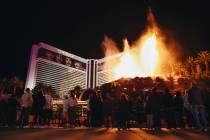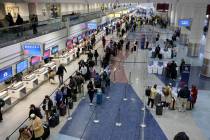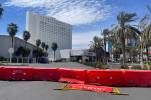Maryland move may bode ill for Penn
Two years ago, anti-gaming forces spent hundreds of thousands of dollars in a failed campaign to stop the Baltimore-based Cordish Cos. from winning voter approval for Maryland Live!, a $500 million slot machine-only casino in suburban Anne Arundel County.
The opposition's advertising blitz employed images of organized crime, prostitution and corruption as examples of what happens when gaming moves into a neighborhood.
Who provided the bulk of the funding for that anti-casino effort?
Regional casino operator Penn National Gaming.
Penn wanted to prevent competition for its Hollywood Casino Charles Town, one of its largest cash cows, just 73 miles away in West Virginia. Maryland Live! opened in June and Penn National executives said last month it was too soon to determine the casino's impact on Charles Town.
Marylanders, get ready for a mudslinging sequel.
State lawmakers last week approved legislation authorizing a sixth casino, this time in Prince George's County, a suburban Washington county the same distance from Charles Town. The measure also gives Maryland's five existing and planned casinos several concessions, including a reduction in the industry-high 67 percent gaming tax and the ability to add table games.
Maryland will have a statewide vote on the changes in November. Prince George's County residents also have to specifically approve the casino destined for the National Harbor retail, dining and entertainment complex on the Potomac River, 10 miles from Washington D.C.
In June, MGM Resorts International announced plans with Peterson Cos., developers of the 350-acre National Harbor, to build a $700 million hotel-casino on the waterfront site.
It's not that Penn National is opposed to gambling in Maryland. In 2010 the company opened Maryland's first casino, the Hollywood Casino Perryville in Cecil County, 30 minutes northeast of Baltimore.
And while Penn National would rather not see a casino in Prince George's County, it's not entirely opposed to it. Penn believes the best new casino location is a brisk walk from National Harbor, at the Rosecroft Raceway in Oxon Hill, which it happens to own.
Penn National holds little hope of landing the sixth casino license, however. To put it in the most diplomatic of terms possible, the company believes it got screwed.
"I think it's safe to say that we have viewed the process from the very beginning as just a sleazy process that has unfolded in Maryland," Penn National Senior Vice President of Public Affairs Eric Schippers said. "We have been on the outside looking in throughout this process, due to what can only be described as a backroom deal between National Harbor and the county executives."
Company Chairman Peter Carlino was more direct.
"I'll say it plainly. It's pretty clear to us that the fix is in," Carlino said.
Wall Street viewed last week's news out of Maryland as a positive for shareholders in MGM Resorts and Caesars Entertainment Corp., which is building the $300 million Harrah's Baltimore and can now add table games.
There was a different take on Penn National.
"This is clearly not good news for Penn National," said Stifel Nicolaus Capital Markets gaming analyst Steven Wieczynski. Charles Town has been "operating under a quasimonopoly with very little competition on the table games side."
Allowing table games both at Maryland Live! and at National Harbor could damage Charles Town's cash flow, which was roughly $185 million in 2011.
So Penn National is prepping for battle.
"Ultimately, if it gets to the ballot, we have no choice but to fight it given our level of investment at Rosecroft," Schippers said.
The campaign will be different from the one two years ago, however.
Penn National won't try to convince voters that gaming is inherently bad, only that MGM Resorts has financial issues that make it so.
Expect to see questions about the interloper's $13.4 billion in debt, the second highest in the industry, and questions about how the company would fund a Maryland project while also chasing expansion opportunities in Toronto, New York City and Massachusetts.
One anti-casino group, the Prince George's County Contractors Association, sponsored a television advertisement in July that dredged up MGM Resorts' much-debated Macau partnership with Hong Kong businesswoman Pansy Ho, which caused the company to divest its holdings in Atlantic City. New Jersey gaming regulators found the partnership unsuitable because Ho's father, billionaire casino magnate Stanley Ho, has casinos allegedly influenced by Chinese organized crime triads.
"We view this as a very serious battle about doing the right thing and sort of stopping what we view as a very flawed effort and literally out of character with what the state has done in the past," Carlino said. "You can appreciate that this will be a very dramatic fight, and we're ready for that."
Ironically, Penn National could have an unexpected ally in the campaign.
Cordish Cos. Chairman David Cordish said in June that adding a casino in National Harbor was unfair because it could slice by 50 percent the customer base of Maryland Live! He thought Maryland should stick with its original plan for five casinos.
"A deal is a deal," Cordish said.
Howard Stutz's Inside Gaming column appears Sundays. He can be reached at hstutz@reviewjournal.com or 702-477-3871. He blogs at lvrj.com/blogs/stutz. Follow @howardstutz on Twitter.























